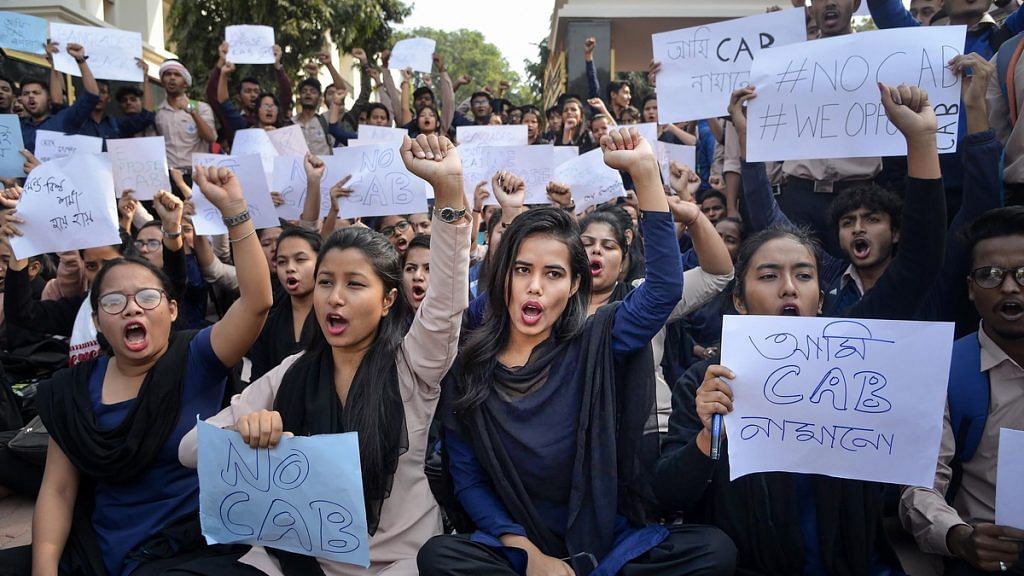During the fourth phase of India’s Covid-19-induced lockdown, the Eco Club of Gauhati University started a hashtag, #SaveDehingPatkai, on social media. The campaign was aimed at spreading awareness about the future of the Assam elephant sanctuary after a recommendation was made by the National Board for Wild Life on 7 April to allow coal mining in it.
This isn’t the first incident of Assam’s students stepping out, literally and metaphorically, and amplifying the state’s issues so that it reaches the rest of India. And it won’t be the last. From ‘Joi Aai Axom’ to protests against the Citizenship (Amendment) Act to Dehing Patkai, student activism has a long legacy in Assam.
Cottonian Jagran Mancha submitted a memorandum opposing coal mining at Dihing Patkai Sanctuary to the CM @sarbanandsonwal,@CMOfficeAssam today. We as the citizens of Assam and students of Cotton University refuse to accept the proposal. #stopcoalmine#savedehingpatkai pic.twitter.com/CEG014rtAu
— Hrishikesh Medhi (@HrishikeshMedh7) May 16, 2020
‘CAA Aami Namanu’
The letters of the slogan, which means ‘we don’t accept CAA’, stood out in red against the vibrant traditional gamusa, as Assamese people across the world took to the streets against the Citizenship (Amendment) Act, then a bill, in December 2019.
The northeast state that barely ever receives the mainland’s attention, even during the most destructive of annual floods, managed to turn the national satellites with its spontaneous protests organised by Assamese students against the introduction of the bill in the Rajya Sabha.
When the countrywide anti-CAA protests gained momentum, it was clear that the Assamese were fighting a different battle altogether. As the rest of India fought against the communal nature of the law, the Assamese were reminded yet again that they were in it alone, to preserve their ethno-linguistic identity.
India joined the protests en-masse on 12 December 2019, when the CAA was enacted by the Narendra Modi government, but the Assamese student community had begun protesting against it way back in 2016, when it was first presented in the Lok Sabha.
Also read: Adil Hussain, Papon join campaign to save ‘Amazon of East’ as Assam trends #SaveDehingPatkai
‘Tumi Jodi Axomiya, Ulaai Aaha, Ulaai Aaha’
‘If you are an Assamese, come out’ has been the clarion call whenever people of the state have decided apun haath jogonnath, porot aakh, bonot baakh, simply meaning that they have to help themselves.
The identity politics in Assam has a complicated history. But if you are an Assamese, you come out, and protest, no-holds-barred.
It was this that had also prompted people, predominantly students, to step out and reclaim the state’s ethnic identity, against illegal immigration from Bangladesh and the constant, sustained apathy of consecutive central governments.
Also read: Assam’s NRC wound was re-opened and then conveniently forgotten by India
‘Joi Aai Axom’
‘Joi Aai Axom’, or Hail Mother Assam, is not the same as ‘Bharat Mata Ki Jai’, simply because Aai is a term used across Assam to address mothers, irrespective of personal beliefs, religious affiliations or ethnic identity. It does not brook exclusion, because being Assamese is about recognising multiculturalism. The All Assam Students’ Union or AASU, uses this slogan in its logo.
More than any political party or government, it is AASU that has consistently taken up issues pertaining to Assam and has made sure the state is answered to. Even in the Dehing Patkai issue and in calling out the illegal mining in the reserve, AASU has been at the forefront.
The Assam Agitation (1979-85) to protect the identity of Assamese people in the wake of influx of people from Bangladesh following the 1971 War of Liberation, was spearheaded by AASU.
The Assam Agitation ended in 1985 with the signing of the Assam Accord and student leader Prafulla Mahanta, who then headed the Asom Gana Parishad, became the youngest chief minister of the state at 35.
Also read: It’s not about religion, it’s about Assam & Assamese pride: AASU advisor on anti-CAA protests
Pre-Independence
While the history of Assam’s student movements often stops at the Assam Agitation, its legacy is much older. It began under the British rule, when in 1873, students put pressure on the colonial regime to provide opportunities for the growth of the Assamese language, so that the region’s youth could have better livelihoods.
Political activism and education have never been in opposition in Assam—what classrooms and textbooks teach, spill on to the streets. Literature and protest go hand-in-hand as is evident in the birth of institutions like of Asomiya Chatror Sahitya Sabha, a literary organisation that also took up issues central to the state.
The BJP might have formed a government in the state, riding on the back of Bir Lachit Phukan’s legacy, but it should remember that legacy teaches Assamese students, ‘Dekhotke mumai dangor nohoi (My maternal uncle is not bigger than my land)’ as they continue to work towards demanding and getting what is due to them.
Views are personal.
